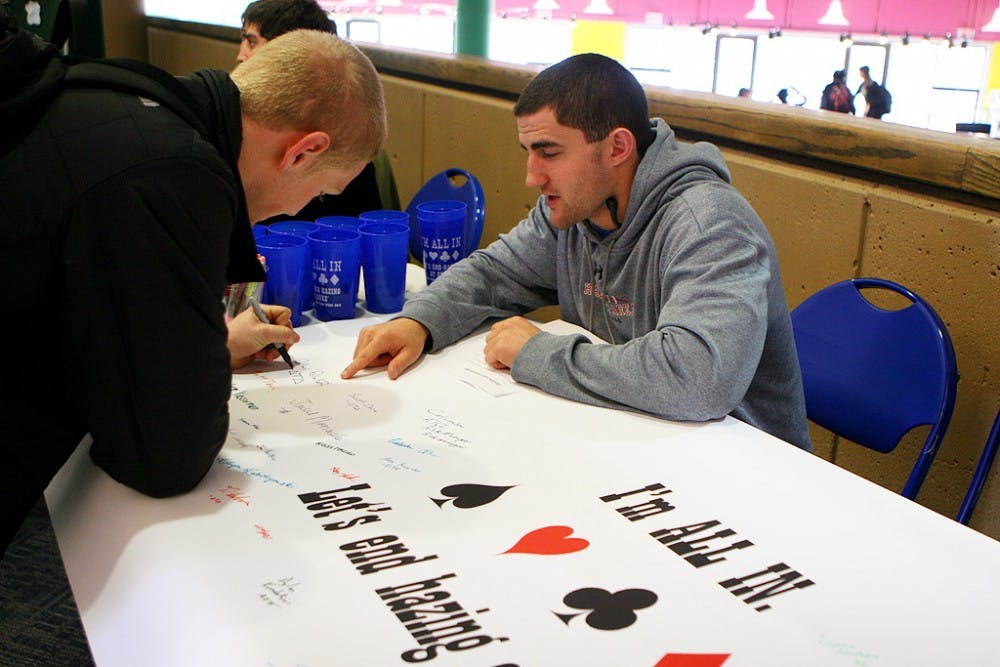Increased reports of hazing incidents have resulted in numerous investigations into the conduct of some student groups.
The administration has either investigated or is presently investigating more than 10 student groups to determine whether the groups are hazing new members, said Vice President for Student Affairs Larry Moneta. Three greek organizations and one non-greek selective living group are currently under investigation following hazing complaints, Moneta wrote in an email Tuesday. An additional investigation into the behavior of a non-residential student club will also begin soon.
Four greek organizations have to date been deemed as hazing new members and two groups have been found not responsible for hazing. Moneta declined to name or comment on specific groups involved because of ongoing investigations.
This is a significant number of hazing investigations to have underway at a particular time, Moneta said in an interview Sunday. Organizations could face consequences not just from Duke but from their national chapters as well.
Jack Kreman, director of operations for the national office of Delta Tau Delta fraternity, said that the Duke chaper of the fraternity—the Delta Kappa chapter—is currently under investigation by his offices. The national office was informed of an incident that took place Feb. 10. Pending the results of the investigation, the national chapter can take action against individual fraternity members or the entire group.
“I wouldn’t go so far to say it’s hazing until we have all the facts,” he said. “Chapter members continue to look into the events that took place that evening.”
Kreman declined to comment further. Members of Duke’s chapter of Delta Tau Delta could not be reached for comment.
The administration is not “cracking down” on hazing, Moneta said, but is instead renewing its efforts to encourage people to report any incidents. As of Sunday, about 20 calls have been made to the confidential hazing hotline this year—a mix of troubled students and parents.
“I do not think that there is more hazing going on— [it is] just students not being bystanders,” Clarybel Peguero, assistant dean of fraternity and sorority life, wrote in an email Monday.
Peguero declined to comment on specific examples or investigations.
A wide range of behaviors are being reported—everything from forced use of alcohol to various forms of ridicule and group practices that could potentially cause psychological harm, Moneta said.
“These are behaviors that have had us very concerned,” he said.
Duke classifies violations into three different levels. Level I violations include road trips, periods of silence and standing for a length of time, and examples of Level II violations are sleep deprivation or interruption of consecutive sleep hours, forced consumption of food and restrictions on eating or bathing. Level III violations, considered the most serious, include branding, compromising sexual situations or paddling in any form. The degree of sanctions increase with the level of violation.
Reports of hazing or potential acts of hazing are investigated by the Office of Student Affairs and its affiliated offices. Hazing is a misdemeanor under the North Carolina state law. According to Duke’s policy, both individuals and the group can be held accountable for hazing.
Dean of Students Sue Wasiolek and Stephen Bryan, associate dean of students and director of the Office of Student Conduct, deferred all comment to Moneta.
Interfraternity Council President Zach Prager, a senior, said the increased reports of hazing are not a result of an increase in the prevalence of such incidents. Moreover, there is a “culture shift” causing students and parents to be more vocal about their concerns, he said.
Prager declined to comment on any particular group or investigation. Additionally, presidents of several greek organizations and selective living groups declined to comment or could not be reached.
“People who are reporting these so-called incidents of hazing—[they] can misconstrue what hazing is and what it isn’t,” he said, noting that students should familiarize themselves with Duke’s hazing policy. “I’m for the effort to stop hazing. We don’t condone it, and we don’t encourage it.... But people need to be aware of what exactly hazing is.”
Get The Chronicle straight to your inbox
Sign up for our weekly newsletter. Cancel at any time.

